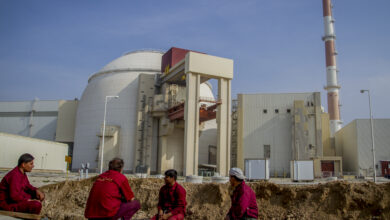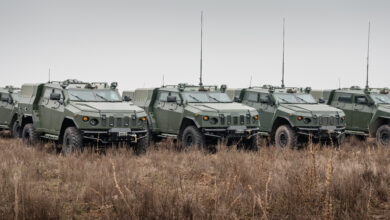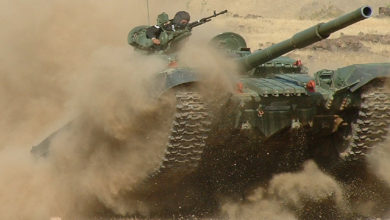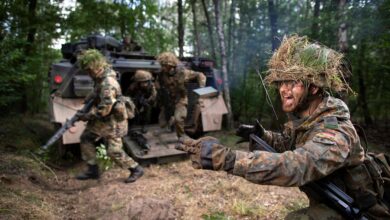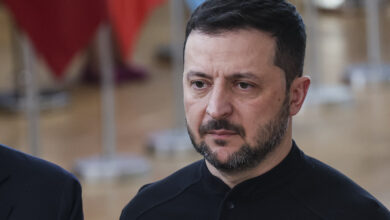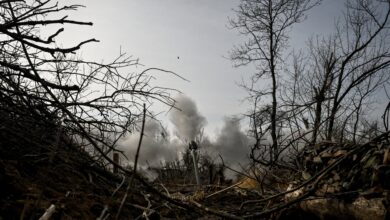
Over the past two decades, Russia has repeatedly violated the international norm of territorial integrity, but the current war Moscow is waging in Ukraine is the first time that Russian aggression has elicited a profound Western response.
A combined effort of US foreign policy and Ukrainian resistance has helped to irrevocably define Russia as an aggressive pariah state and unite a divided West against Russia.
This is an important shift in the global order, which had increasingly fractured along liberal and illiberal lines.
Ignoring Russia
While the focus of US foreign policy shifted to Asia and managing China’s rise, Western governments largely ignored Moscow’s revisionist behavior.
In addition to repeated incursions into the territories of neighboring sovereign states, the Kremlin committed war crimes, including attacks on civilians, and interfered in the democratic processes of many Western states.
Over the past decade, Russia has become increasingly repressive toward its own citizens, forcefully quelling any signs of domestic dissent.
Woman holds up a blank sheet of paper in Russia's Nizhny Novgorod. Instant arrest. Speaks volumes, along with those videos from Moscow of protesters being hauled away by riot police literally seconds after unfurling anti-war banners. pic.twitter.com/KSLjC4l6Ii
— Alejandro Alvarez
(@aletweetsnews) March 12, 2022
Despite all of this, Western powers, and in particular Europe, had been reluctant to treat Russia as a pariah state. For the most part, the relationship between European states and Russia had been characterized by strong business ties and normalized relations.
Even up to the eve of Russia’s invasion of Ukraine in February 2022, Germany stuck to Ostpolitik — the West German foreign policy designed to maintain close and consistent relations with Russia even during the Cold War.
West Opens Its Eyes
On the surface, there was no reason for Russia’s latest aggression to garner different Western responses than its ventures in Crimea, Georgia, or Syria.
But today, Russia’s aggression has been with the most severe sanctions regime the West has ever imposed on a major economy. These include wide-ranging measures targeting Russia’s banking, financial, industrial, private, and energy sectors.
Even more remarkably, global sentiment towards Russia has seismically shifted overnight, leading to self-sanctions by major international firms and private and cultural institutions. Economic relations crafted in the decades since the Cold War have been undone in days.
Three factors make this the defining moment for the Putin regime.
True Nature of Putin’s Regime
First, prominent individuals within the Biden administration had long regarded Putin as a rogue international actor. Putin’s invasion of Ukraine was an opportunity to persuade other Western governments and citizens of their view.
Political science literature theorizes that states reveal their intentions through signaling, which other states can misinterpret.
The most salient historical example of misperception is the response to Hitler’s March 1938 annexation of Austria. The West conveniently misperceived Hitler’s aggressive intentions as limited and thus enabled him to take the Sudetenland, a key industrial region that would later be crucial to his war efforts. The West only awakened to the scale of Hitler’s ambitions when he annexed Czechoslovakia a year later.

The Biden administration has framed the Russian invasion of Ukraine as a signal that finally reveals the true nature of the Putin regime: a state with insatiable revisionist aims.
By sharing intelligence and repeatedly warning the public of Putin’s intentions as the US has never done before, the administration sought to shape how the signal of Russia’s invasion would be interpreted by the global community, namely, as a defining characteristic of Putin’s Russia.
Ukraine’s Domestic Transformation
Second, since Putin annexed Crimea in 2014, Ukraine has undergone a significant domestic transformation.
In many ways, Putin’s annexation of Crimea ignited a process of nation building in Ukraine and helped steer Ukrainian identity toward European values and culture. Over the past few years, Ukraine has increasingly been viewed as part of the greater European community.
Crucially, where Putin’s previous attacks occurred in places Europeans viewed as remote and “other,” this invasion felt like an attack on Europeans with a shared fate.
This also helps explain why Ukrainian refugees are being met with open arms by neighboring states, including Poland, Romania, and Hungary, in striking opposition to the response of the 2015 refugee crisis.
Fierce Resistance
Finally, Ukraine’s fierce resistance to the Russian invasion is inspiring both awe and fear in neighboring European countries.
The Baltic States and Poland have long viewed a Russian invasion as a realistic possibility. More powerful European states repeatedly ignored these concerns, leading to deep divisions and lagging European security.
The invasion of Ukraine viscerally illustrates these fears, and has indeed prompted a reevaluation and unprecedently unity over European security.
Ukraine’s ongoing resolve has also continued this conflict longer than many analysts anticipated. This solidifies the shift in attitude towards Russia and makes it difficult for European states to go back to business as usual.
The New Global Order
The transatlantic alliance is the strongest it has been since the end of the Cold War.
Before the invasion, Putin was seeking a radical reevaluation of European security in Russia’s favor. He instead achieved the opposite: uniting a divided and purposeless European security community and reviving the transatlantic alliance.
This is no small feat; the Trump administration actively worked to dismantle the alliance, calling NATO obsolete and accusing European states of free-riding on America’s security spending.
Now, however, joint security has become a top priority, even for the notoriously reluctant European actors. New German chancellor Olaf Scholtz made a historic reversal in Germany’s foreign policy when he announced an unprecedented investment in German security.

This war has also brought together previously hostile European factions. Last fall, populist governed Poland was convicted of violating European law and sanctioned by the EU. Now, it is at the center of Europe’s united front against Russia.
Hungary’s Victor Orbán led a years-long anti-Brussels campaign and was accused of degrading Hungarian rule of law and democracy. Orbán has long courted Russia, cultivating a personal relationship with Putin and praising his leadership style. Now Orbán may face backlash in the upcoming Hungarian parliamentary elections.
Hard divisions between European right-wing populists and liberals have seemingly fallen away in the face of the Russian external threat.
This unity is indeed a threat to Putin but it may be too late to help Ukraine. NATO, fearing escalation, is committed to non-interference, and undermining the Putin regime with economic sanctions will at best be a slow process.
The Biden administration has used this moment to highlight the centrality of the transatlantic alliance, but the precarious fate of Ukraine remains outside central the US geopolitical strategy.
Dr. Emily Holland (@EmilyJHolland) is an Assistant Professor in the Russia Maritime Studies Institute at the US Naval War College.
Dr. Hadas Aron (@hadas_aron) is a Faculty Fellow at the Center for European and Mediterranean Studies at NYU.
The views and opinions expressed here are those of the author and do not necessarily reflect the editorial position of The Defense Post.
The Defense Post aims to publish a wide range of high-quality opinion and analysis from a diverse array of people – do you want to send us yours? Click here to submit an op-ed.


